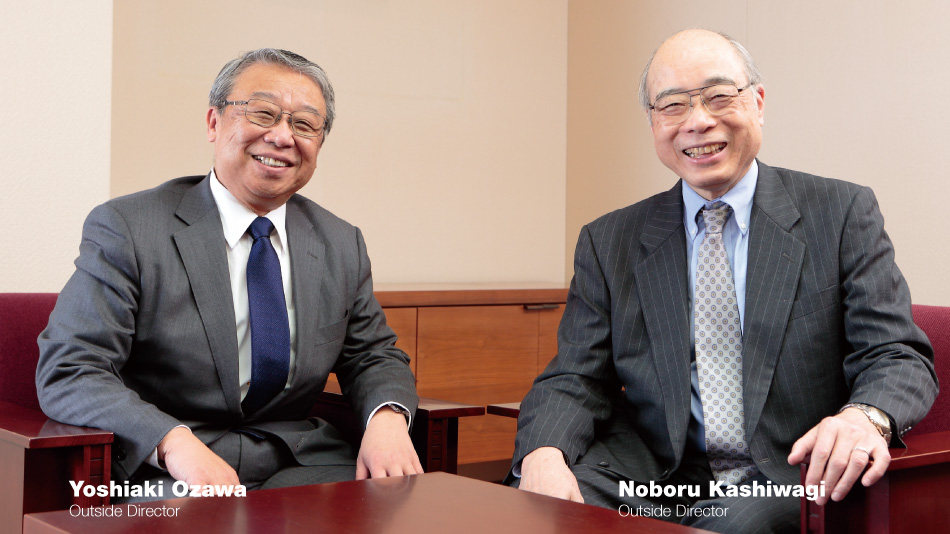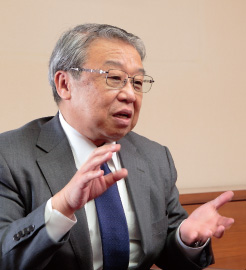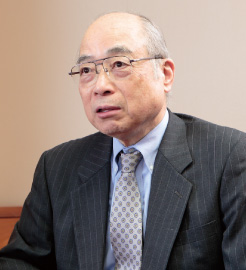Discussion with the Outside Directors

Increasing the transparency of management and
managing companies in the interest of all stakeholders
will realize sustainable corporate growth.
It has been one year since Japan’s Corporate Governance Code went into effect. The operating environment for corporate governance is changing. Could you please tell us what points you are emphasizing the most as outside directors?
Ozawa: I believe the most important thing about corporate governance is increasing transparency as a corporation and not creating hidden barriers that impair communication. If companies have strong barriers between divisions, it is difficult to do internal checks on the activities of sections protected by these walls, and they may even become a cause of fraud.
Kashiwagi: Most cases of corporate fraud in Japan take place without ever being noticed by the board of directors. That means that ensuring transparency by way of efficient and good communication is very important. To be sure that corporate governance is really working, the tone at the top encouraging good communication is very important.
Ozawa: One failure case of this is an incident in a Japanese company that involved corporate governance, where improper behavior was the fault of the organization, while the individuals involved did not benefit in any way. All types of organizations are operated by people; therefore, to introduce Japan’s Corporate Governance Code effectively, it will be necessary to take account of unique circumstances that exist in Japan.
Kashiwagi: Many corporate frauds arose because there are people who take the instructions of top management and their bosses too seriously. This puts strong pressure on these people to carry out by any means the instructions, and, in many cases, may lead to corporate frauds.
As you pointed out, we have to keep Japan’s characteristic circumstances in mind when considering about corporate governance. From the perspective of the board of directors, what do you think is different in Japan, compared with the United States, for example?

Ozawa: Japan’s Corporate Governance Code assumes that the board of directors will play a supervisory role. Under this governance model, the role of the board of directors is to specialize in supervising management. This is an organizational structure similar to governance in the United States. Under another governance model, the role of the board of directors is more “managerial,” and it specializes mainly in making decisions about the business strategies.
Kashiwagi: In case of the type of “a Company with an Audit & Supervisory Board” under the Japanese law, the board must make the decisions on important managerial matters, such as “disposing and purchasing of major company assets” and “incurring large liabilities.” Japanese companies of this type have necessarily adopted the management-type board of directors. Since Daifuku is a company with the Audit & Supervisory Board, in this sense, we can say that its Board of Directors adopts the management model of directors.
Ozawa: Under the management model, the board of directors is required to steer the company toward sustainable growth in corporate value. Today, though, after the Corporate Governance Code has gone into effect, the next topic we should discuss is whether or not it is a good idea to continue to maintain the management model.
Kashiwagi: However, the monitoring model and the management model are not necessarily incompatible. If we maintain the management model, but delegate as much authority as possible to executive directors while the outside directors monitor their performance, I believe this approach will combine the best features of the two models. In any case, an important part of the role of outside directors is to prevent the management from sacrificing the company’s interest for their own benefit. When the outside directors perform these monitoring functions to prevent such conflict of interest, they will benefit investors and other stakeholders.
Taking into account what we have discussed so far, regarding recent activities, could you please give us some of your thoughts on the atmosphere in Daifuku’s Board of Directors and establishment of an Advisory Committee?

Kashiwagi: Daifuku’s Board of Directors adopts the management type of governance model as explained above, by operation of law. For example, the Board decides such matters as issuing convertible bonds and M&A. Since the outside directors have joined the Board, the atmosphere in the meetings has been consistently free and open, and we engage in active discussions.
Ozawa: President Hojo has listened carefully to what people said in the Board meetings, and I believe that this creates an atmosphere where it is easy to express our opinions. I feel that the attitude of top management plays a big role in while the atmosphere of Daifuku is created.
Kashiwagi: From a corporate governance point of view, Daifuku has newly formed an Advisory Committee, and we have been appointed as members. Our roles include checking on whether the process for selecting management is transparent and appropriate. Also, the Committee oversees the compensation level of directors.
Ozawa: It is very important that the outside directors, as members of the Advisory Committee, participate in the process of selecting directors. This is because they have an awareness of persons within the Company and the perspectives of persons outside the Company. For example, this means they will not select a candidate who has a special interest in the Company and its directors.
The outside directors can now act as advisors for the next generation of candidates for the management team, but, from a different perspective, this should act as a filter and prevent incorrect personnel choices. As a last point, since the roles of the Board of Directors are under discussion, how do you view your roles as outside directors of Daifuku?
Ozawa: In Japan, the situations of accounting and laws differ from those in other countries. Since Japan has some unique cultural and business practices, it is not sufficient to apply discussions related to corporate governance overseas directly to Japan. We, as outside directors, must be aware that we need to gain an in-depth understanding of corporate governance, and, based on this understanding, perform our duties as supervisors of the overall management of the Company.
Kashiwagi: As one of the roles performed by outside directors, we are expected to look after the interests of all stakeholders. From the perspective of outside stakeholders, an important role of the outside directors is to ensure that directors are working for all the stakeholders and for the purpose of increasing the long- and medium-term value of the Company. To realize sustained growth, we must be aware of the need to maintain good relationships with all stakeholders, including shareholders and institutional investors, employees, customers, and the community. The greatest assets of companies are their human resources. We must employ highly capable human resources, regardless of gender and nationality, and put them into places that will enable them to contribute to the best of their capabilities.
Since Daifuku is placing a high priority on promoting diversity, we look forward to seeing the results. Thank you for participating in our discussion today.

